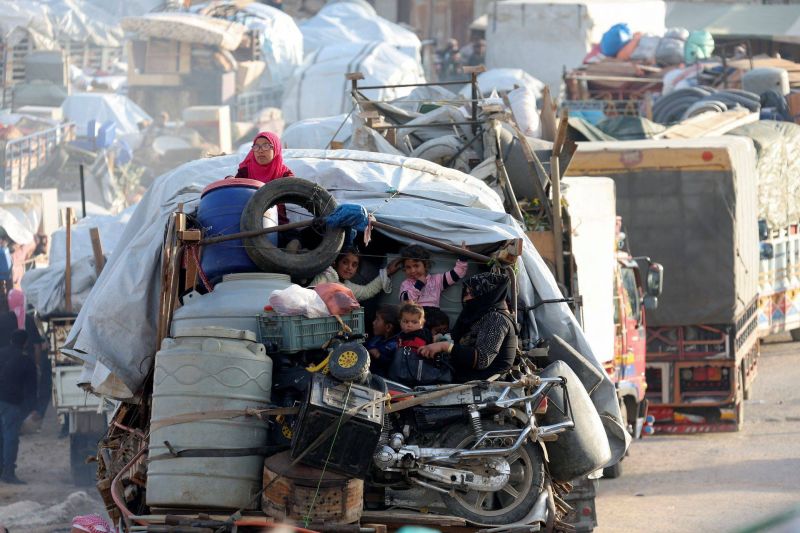
Syrian refugees sit with their belongings on a pick-up truck as they prepare to return to Syria from Wadi Hmayyed, on the outskirts of the Lebanese border town of Arsal, Lebanon Oct. 26, 2022. (Credit: Mohamed Azakir/Reuters)
Want to get the Morning Brief by email? Click here to sign up.
The US-mediated maritime border agreement between Lebanon and Israel is scheduled to be signed today at the headquarters of the United Nations Interim Force in Lebanon (UNIFIL) in Naqoura, South Lebanon. Amos Hochstein, the mediator in the indirect negotiations between the warring parties, arrived in Beirut last night. Lebanese and Israeli delegations will separately meet in Naqoura with the US envoy, who will then transfer the signed agreements to the United Nations. Before heading to Naqoura, Hochstein will obtain a signature from President Michel Aoun at the Baabda presidential palace. Aoun announced his approval of the agreement earlier this month in a televised address following long-winded negotiations and urged the immediate start of offshore gas exploration after the deal is signed. Israel, meanwhile, launched gas production in the Karish field where a controversial vessel sparked tensions with Lebanon earlier this summer, reigniting stagnated border negotiations. Yesterday, the cabinet approved a shift in the consortium licensed to explore offshore oil and gas blocks, transferring French energy company TotalEnergies’s share to DAJA 215 and the Ministry of Energy’s share, temporarily, to DAJA 216.
Despite “logistical issues,” several hundred Syrian nationals were repatriated in the first convoys of Lebanon’s mass refugee return plan, caretaker Social Affairs Minister Hector Hajjar said yesterday. Caretaker Minister of the Displaced Issam Charafeddine estimated last Friday that 6,000 people would be repatriated on the inaugural trip. “There are other [repatriation] groups, and we will continue," Hajjar added. Separate repatriation trips were launched from Nabatieh, Tripoli, and Arsal — a town in Lebanon's Bekaa Valley. Despite Lebanese officials’ insistence on the voluntary aspect of the repatriation plan, rights groups consider Syria unsafe for return and say the plan puts refugees “at risk of suffering from heinous abuse.”
Caretaker Health Minister Firas Abiad called on the Finance Ministry to deliver “promised cash assistance” to public health workers on the front lines of Lebanon’s cholera outbreak. There are now 346 confirmed cases and 14 deaths. During a press conference yesterday, Abiad said the Health Ministry is offering free water tests for municipalities. The first case of cholera in nearly 30 years was recorded in northern Lebanon on Oct. 6. Since then, the disease has spread to different areas, recently being detected in sewage water in Beirut and Mount Lebanon. The spread of cholera is linked to inadequate access to clean water. Lebanon’s water infrastructure has been impacted by supply deficits from Electricité du Liban. While experts deemed public water sources to be relatively safe, shortages can lead citizens to seek out riskier sources. Protests against water shortages in Saida escalated yesterday when demonstrators broke into the South Lebanon Water Establishment (SLWE). The SLWE blamed the water cuts on electricity shortages. Fuel provision to power water infrastructure is among the measures undertaken by local and international actors to curb the spread of cholera.
Many hotels in Lebanon have "started to close their doors" due to the decline in booking rates and the continued electricity crisis, Pierre Achkar, the president of the Federation of Tourist Unions in Lebanon said Wednesday. Despite the country experiencing a strong tourism season this past summer, only “about 40 percent of hotels are occupied in Beirut while 15 percent are outside the capital," Achkar indicated. These "poor rates" of occupancy are due to "instability and tensions in Lebanon'' at the political and security levels, but the main reason behind hotels' decision to close down, according to Achkar, is the rising operational cost due to increased prices for fuel oil, which is used to operate private generators that compensate for the near-total power cuts. Electricité du Liban's power plants suffer from the lack of funds to import fuel oil to operate which creates a strong reliance on private generators, whose subscription fees are exorbitant. Achkar expressed regret for "a weakening of tourism activity in Lebanon" with the coming of autumn.
Lebanon’s ranking in the global rule of law index fell two places since last year, according to the World Justice Project. Lebanon showed improvements in order and security but performed poorly on corruption and criminal justice. The index is a composite of eight factors: constraints on government powers, absence of corruption, open government, basic rights, order and security, enforcement of regulations, civil justice, and criminal justice. Lebanon ranked second to last among Algeria, Egypt, Iran, Jordan, Morocco, Tunisia and the United Arab Emirates in the criteria of "fundamental rights," "order and security" and "civil justice." Lebanon followed global trends in the decline of the rule of law indicated by the World Justice Project.
In case you missed it, here's our must-read story from yesterday: “How and by whom will the Lebanon-Israel maritime border deal be signed?”
Compiled by Abbas Mahfouz